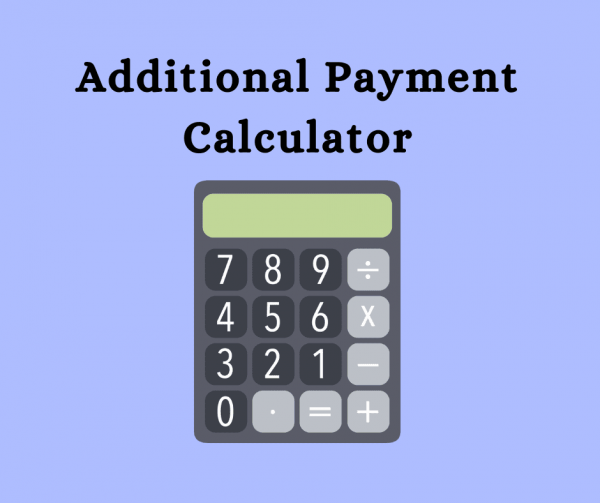Use this extra (additional) payment calculator to assess the impact of paying extra on your loan (mortgage).
(Payments per year):Loan (Mortgage) Amount $:Loan/Mortgage Term (in years):Years Remaining:Annual Interest Rate (%):Additional Payment Amount $:
How to use this extra payment calculator
- Select the payment plan (this is the number of payments you make in a year)
- Enter the total loan or mortgage amount
- Enter the loan/mortgage terms in years (this is the total number of years to repay the loan)
- Enter the years remaining (if you have already started the payment, enter the remaining years)
- Enter the annual interest rate (without % sign)
- Now enter the additional payment in each payment that you want to add to your regular payment
- Press calculate to see the results
Analyzing the results:
Key terms used in the result section of the above extra payment calculator:
- Time Saved: It is the time you save on the total loan term. The time saved is expressed in year(s) and month(s). In the default calculation, the time saved is 1 Year(s) and 1 Month(s). It means that, by paying extra, the loan is paid one year and one month earlier than the original time.
- Interest Saved: It is the amount of interest you don’t have to pay during the repayment.
- New Payment: It is the new periodic payment which also includes the additional payment.
- Old Payment: It is the old periodic payment without including additional payment.
What happens when you pay extra on your loan?
Paying extra directly cuts down the remaining principal you’ll owe in future years. Less principal = less interest to pay later.
When you pay extra, good things happen:
- Shorten the timeline to pay off the loan and become debt-free faster
- Reduce total interest that builds up over time, saving potentially big money
- Show lenders you’re responsible, improving your creditworthiness
- Get psychological benefits of paying debt quicker – feel empowered and in control
Related: Loan (Mortgage) Payment Calculator with Amortization Schedule
What is the impact of paying extra on debt?
Extra payments have a big impact on all debt – student loans, credit cards, mortgages, etc. Here’s how they help reach financial freedom:
- Substantially shorten the time to become debt-free. For a $10K loan at 10% interest with $200 monthly payments, it would take 5.5 years to pay off just making minimums. But adding an extra $100 a month cuts that timeline down by over 2 years. (Use the above additional payment calculator to validate this result or try more scenarios)
- Minimize interest piling up over time. The longer you carry a balance, the more interest builds up. Extra payments directly lower the principal balance used to calculate interest, saving potentially thousands of dollars.
- Boost creditworthiness. Regular extra payments show financial discipline, improving your credit score. As debt shrinks, your credit utilization ratio improves too, signaling reliability.
- Provide mental and emotional benefits. Paying off debt faster gives a sense of control and empowerment. Seeing balances go down can reduce stress, boost confidence, and improve relationships.
- Allow flexibility for future opportunities. With less monthly debt payments, you free up money to save, invest, start a business, etc. Extra payments pave the way to confidently seize future financial goals.
In summary, additional payments accelerate your path to financial freedom by reducing interest costs, improving credit, and enhancing well-being. Making this a habit unlocks huge benefits beyond just debt repayment. So take control of your finances and unleash the power of extra payments. The road to financial freedom starts with one step.
The above extra (additional) payment calculator on your loan (mortgages) can be a useful tool to assess your benefits.
FAQs: Making Extra Payments on Your Loan
What are extra payments on a loan?
Extra payments are optional payments that go beyond your regular monthly amount. They are applied directly to the principal loan balance, rather than interest or fees.
Is it a good idea to make extra payments?
Yes! Extra payments can save you money on interest, help you pay off the loan faster, boost your credit score, and give you a sense of control over your finances. It’s usually a smart move if you can afford it.
How do I actually make an extra payment?
Just add an extra amount to your regular monthly payment. Be sure to specify it should go toward the principal. You can indicate this on your payment coupon or through your lender’s online payment system.
What are the different repayment schedules?
There are two main types – even principal payments and even total payments. With even principal payments, the amount going to principal stays the same each month. For even total payments, the total monthly payment stays the same, but the share going to principal increases over time.
Why bother making extra payments?
Because they can dramatically cut down the interest you pay over the life of the loan. Extra payments also let you pay off debt faster, improve your creditworthiness, and give you financial flexibility.
What happens when you pay extra?
You shrink the principal balance quicker, shortening how long it takes to pay off the loan. You also reduce the interest that accrues over time, saving money. It shows lenders you are reliable and can boost your credit too.
What are other names for extra payments?
Additional repayments, overpayments, or extra principal payments.
Do extra payments reduce my interest costs?
Absolutely. Paying extra lowers your principal balance faster, so interest is calculated on a smaller amount each month. This cuts your total interest costs.
Should I make extra payments?
It depends on your situation, but it’s usually wise if you have the means. Run the numbers to see potential interest savings. Also, consider other financial goals before deciding. But overall extra payments are a great tool for paying off debt faster.



